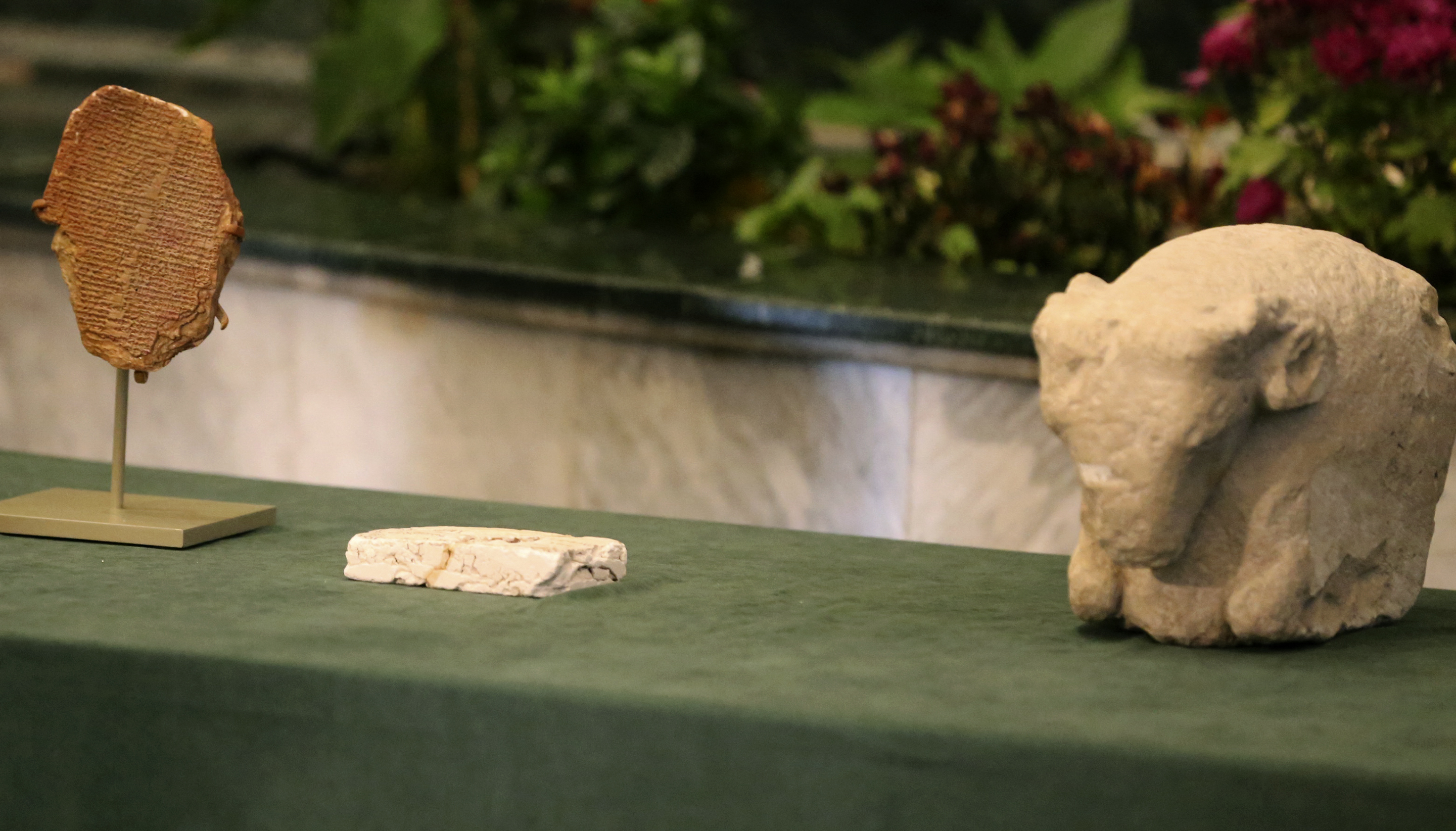Iraq


The Gilgamesh Tablet, a 3,500-year-old Mesopotamian cuneiform clay tablet is displayed in the Iraqi Ministry of Foreign Affairs in the capital Baghdad on December 7, 2021 after its repatriation. Photo: AFP
prev
next
ERBIL, Kurdistan Region - Three decades after having been stolen from an Iraqi museum and imported illegally into the US, a 3,500-year-old clay tablet featuring a portion of the epic of Gilgamesh has been returned to Iraq, its country of origin, Iraqi officials celebrated on Tuesday.
Iraq’s Minister of Culture, Hassan Nadhem, announced on Twitter that he had received the cuneiform tablet from Iraqi Foreign Minister Fuad Hussein in a small ceremony in Baghdad.
Nadhem said during a press conference that the country was “witnessing a new era” as increasing numbers of antiques are returned to Iraq “in cooperation with other institutions.”
Along with the epic of Gilgamesh, a statue of a ram's head and another Sumerian tablet were also recovered and put on display in Baghdad on Tuesday.
In his statement on Monday, Nadhem congratulated the "great efforts made by workers in the Antiquities and Heritage Authority and our embassies around the world, which led to the return of thousands [of] artifacts, the most important of which is the return of the Gilgamesh Tablet and the Sumerian ram.”
The tablet was formally returned to Iraq in September, during a ceremony at the Smithsonian Institution in Washington DC, where the United Nations Education, Scientific and Cultural Organisation (UNESCO) celebrated the handover of the artifact, calling it a “victory in the fight against the illicit trafficking of cultural objects.”
“By returning these illegally acquired objects, the authorities here in the United States and in Iraq are allowing the Iraqi people to reconnect with a page in their history”, Audrey Azoulay, UNESCO’s Director-General said.
The tablet is believed to have been stolen from an Iraqi museum during the first Gulf War. Iraqi antiquities have been subjected to frequent looting and vandalism since 2003, the most severe of which was in 2014 when the Islamic State (ISIS) occupied large swathes of the country.
Around 17,000 antique artifacts have been returned to Iraq from the US since July, most of which date back to the Sumerian period around 4,000 years ago, one of the oldest civilizations in Mesopotamia.
Nevertheless, issues remain in the pursuit of historical Iraqi artifacts. There has been a considerable increase in illicit excavations in recent years, according to a survey by the International Criminal Police Organization (INTERPOL).
Iraq’s Minister of Culture, Hassan Nadhem, announced on Twitter that he had received the cuneiform tablet from Iraqi Foreign Minister Fuad Hussein in a small ceremony in Baghdad.
Nadhem said during a press conference that the country was “witnessing a new era” as increasing numbers of antiques are returned to Iraq “in cooperation with other institutions.”
Along with the epic of Gilgamesh, a statue of a ram's head and another Sumerian tablet were also recovered and put on display in Baghdad on Tuesday.
وزارة الثقافة تتسلّم لوح گلگامش من وزارة الخارجية. تحية لجهود وزارتي الخارجية والثقافة (الهيئة العامة للآثار والتراث). دبلوماسية الاسترداد مستمرة بعد أكبر حدثيْ استرداد في العام: لوح گلگامش و 17000 قطعة أثرية استعيدت من الولايات المتحدة الأمريكية. #العراق pic.twitter.com/TWrOnOBmUz
— Hassan Nadhem (@HassanNadhem) December 7, 2021
In his statement on Monday, Nadhem congratulated the "great efforts made by workers in the Antiquities and Heritage Authority and our embassies around the world, which led to the return of thousands [of] artifacts, the most important of which is the return of the Gilgamesh Tablet and the Sumerian ram.”
The tablet was formally returned to Iraq in September, during a ceremony at the Smithsonian Institution in Washington DC, where the United Nations Education, Scientific and Cultural Organisation (UNESCO) celebrated the handover of the artifact, calling it a “victory in the fight against the illicit trafficking of cultural objects.”
“By returning these illegally acquired objects, the authorities here in the United States and in Iraq are allowing the Iraqi people to reconnect with a page in their history”, Audrey Azoulay, UNESCO’s Director-General said.
The tablet is believed to have been stolen from an Iraqi museum during the first Gulf War. Iraqi antiquities have been subjected to frequent looting and vandalism since 2003, the most severe of which was in 2014 when the Islamic State (ISIS) occupied large swathes of the country.
Around 17,000 antique artifacts have been returned to Iraq from the US since July, most of which date back to the Sumerian period around 4,000 years ago, one of the oldest civilizations in Mesopotamia.
Nevertheless, issues remain in the pursuit of historical Iraqi artifacts. There has been a considerable increase in illicit excavations in recent years, according to a survey by the International Criminal Police Organization (INTERPOL).








Comments
Rudaw moderates all comments submitted on our website. We welcome comments which are relevant to the article and encourage further discussion about the issues that matter to you. We also welcome constructive criticism about Rudaw.
To be approved for publication, however, your comments must meet our community guidelines.
We will not tolerate the following: profanity, threats, personal attacks, vulgarity, abuse (such as sexism, racism, homophobia or xenophobia), or commercial or personal promotion.
Comments that do not meet our guidelines will be rejected. Comments are not edited – they are either approved or rejected.
Post a comment